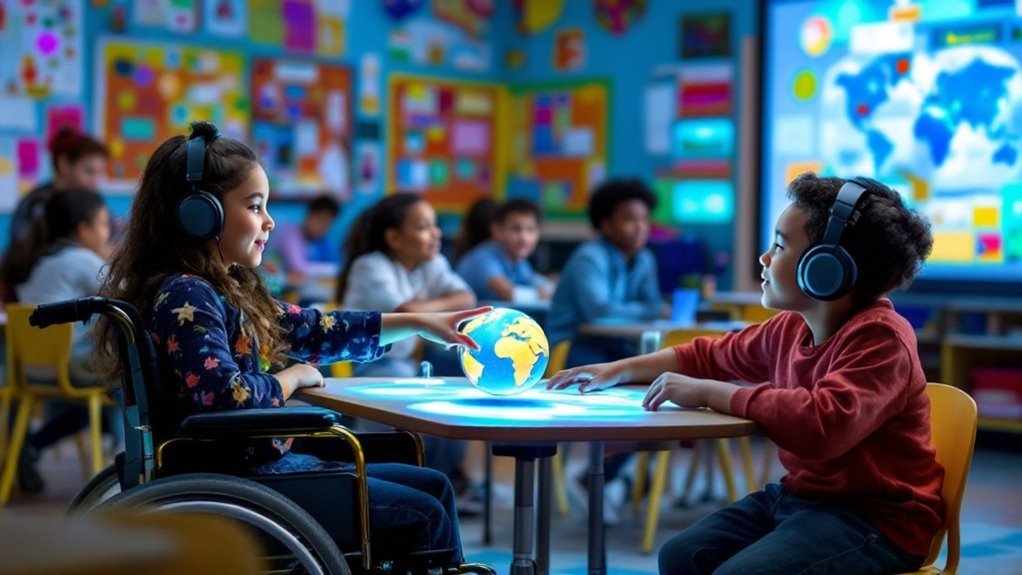In 2025, AI's revolutionizing education by personalizing learning experiences that cater to your unique needs. It automates administrative tasks, allowing teachers to focus on building meaningful relationships with you. AI offers real-time analytics, providing immediate feedback and identifying challenges before they escalate. Curricula are adapting to job market demands, seamlessly integrating crucial skills for future careers. Furthermore, equitable access is prioritized, ensuring every student benefits from tailored resources and support. Embracing AI leads to a more inclusive, engaging, and effective educational journey, enhancing your chances for success in an evolving world. There's so much more to investigate.
Key Takeaways
- AI streamlines administrative tasks, allowing teachers to focus on building meaningful relationships with students and enhancing their learning experiences.
- Real-time analytics and predictive insights enable educators to identify student challenges early and tailor their instruction accordingly.
- Personalized learning paths created by AI cater to individual student needs, enhancing engagement and promoting academic success.
- Curriculum integrations with AI concepts and soft skills prepare students for future job markets, aligning education with industry demands.
- AI-driven assistive technologies ensure equitable access to learning resources, promoting inclusivity for diverse student populations.
Supporting Teachers' Roles

In today's fast-paced educational environment, AI is transforming the way teachers operate, empowering them to reclaim valuable time. By automating administrative tasks such as drafting emails and organizing schedules, you can focus more on what truly matters: your students. AI chatbots lighten the load for school principals, while intelligent systems manage student records, streamlining operations across the board.
Additionally, AI improves collaborative planning among educators. Imagine utilizing AI tools to design lesson plans that cater to diverse learning styles, allowing for tailored mentorship opportunities between teachers and students. These technologies analyze data to inform decision-making, ensuring that your lessons are not only effective but also aligned with curriculum standards. This integration of personalized learning further enhances the educational experience for both students and teachers alike.
With AI's support, you can engage in strategic initiatives, transforming your role from merely delivering content to nurturing a rich learning environment. You'll have more time for relationship-building and meaningful interactions, crucial elements in education. By embracing these innovative tools, you're not just adapting to change; you're actively shaping the future of education, improving your professional development and enriching the experiences of your students.
Enhancing Assessment and Analytics
Frequently, educators find themselves overwhelmed by the demands of assessment, but AI is changing that narrative. With advancements in technology, assessments are becoming more streamlined and insightful, allowing you to focus on what truly matters: student engagement and success. Here are four ways AI improves assessment and analytics:
- Automated Feedback: AI-enabled assessments deliver timely, personalized feedback, helping students understand their strengths and weaknesses.
- Predictive Insights: By analyzing data throughout the learning journey, AI identifies potential challenges early, enabling you to intervene before issues escalate. Additionally, AI analyzes behavior and academic performance to provide more targeted support for students.
- Real-Time Analytics: You gain access to advanced data analytics that reveal student progress, allowing you to adapt your instructional strategies effectively.
- Accessibility and Inclusivity: AI designs assessments that cater to diverse learners, ensuring that all students can participate fully and equitably.
These innovations not only expedite the assessment process but also amplify your teaching practices. By leveraging AI, you can create a more responsive learning environment, ensuring every student receives the support they need to thrive. Adopt these tools, and watch your educational strategies transform for the better.
Personalizing Learning Experiences

Personalized learning experiences are transforming how you interact with students, making education more customized and effective than ever. With AI at your fingertips, you can create tailored learning paths that align with each student's preferences and learning styles. This personalized content not only improves student engagement but also guarantees that lessons adapt in real-time, keeping students neither bored nor overwhelmed.
AI's ability to provide adaptive feedback is vital; it analyzes performance data to identify areas where students struggle, offering targeted resources for improvement. You can empower students to learn at their own pace, allowing them to skip redundant lessons or access additional support when needed. This flexibility is invaluable, especially in a multilingual classroom, where AI-generated content can cater to diverse linguistic needs.
Furthermore, AI-driven interactive tutorials and immediate feedback on assignments promote an engaging learning environment. By automating routine tasks like grading, you can focus on what matters most: building meaningful connections with your students and facilitating their growth. Consequently, you're not just teaching; you're creating a dynamic, responsive educational experience that prepares students for success in a rapidly changing world.
Adapting Curriculum to Job Markets
To stay relevant in today's job market, adapting your curriculum to emerging AI roles is imperative. The rapid evolution of technology demands that you adopt curriculum innovation and nurture industry collaboration. Here are four strategies to evaluate:
- Incorporate AI Skills: Embed fundamental AI and machine learning concepts into your programs, ensuring students grasp the tools employers prioritize.
- Focus on Soft Skills: Teach communication, problem-solving, and teamwork, as these are significant in an AI-driven workplace.
- Engage with Industry Experts: Collaborate with tech leaders to align your curriculum with real-world job requirements, ensuring students learn what's applicable.
- Promote Continuous Learning: Encourage a mindset of lifelong learning by integrating online platforms and certifications that provide ongoing skill development.
Promoting Equity and Accessibility

As education evolves to meet the demands of emerging job markets, it's just as important to confirm that all students have equitable access to learning opportunities. AI-powered platforms are transforming education by enhancing personalized learning experiences tailored to individual needs. Adaptive algorithms adjust content in real-time, guaranteeing that every student receives the support they need—whether through visual aids for visual learners or auditory prompts for those with hearing impairments.
Moreover, integrating assistive technologies like voice-activated software and screen readers promotes inclusive environments. These tools empower students with mobility challenges or learning disabilities, allowing them to engage fully in the classroom. Compliance with accessibility standards, such as WCAG, further verifies that digital materials are usable for all students.
Conclusion
As you welcome AI in education, you might worry about its impersonal nature. Nevertheless, think of AI as a powerful tool that empowers teachers rather than replaces them. By automating routine tasks, it frees up educators to focus on building meaningful connections with students. This synergy not only personalizes learning but likewise guarantees that every student receives the support they need. In 2025, AI isn't just a trend; it's the key to releasing every learner's potential.



